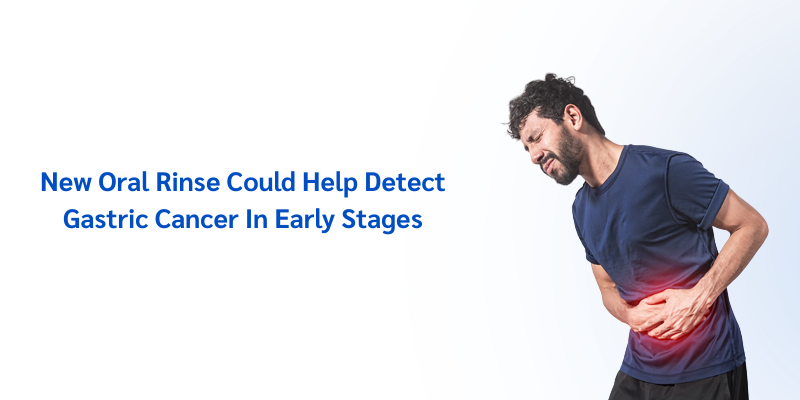Gastric cancer, commonly known as stomach cancer, is one of the most challenging cancers to diagnose early. By the time symptoms appear, the disease is often in an advanced stage, making treatment more difficult. However, a new oral rinse test offers hope for detecting stomach cancer in its earliest stages, potentially saving thousands of lives.
Understanding Stomach Cancer
What is Stomach Cancer?
Stomach cancer develops when abnormal cells grow uncontrollably in the stomach lining. This type of cancer can spread rapidly, making early detection crucial.
Common Stomach Cancer Symptoms
Recognizing stomach cancer symptoms early can significantly improve survival rates. Some early warning signs include:
- Persistent indigestion or heartburn
- Feeling full quickly after eating small amounts
- Unexplained weight loss
- Nausea or vomiting
As the disease progresses, more severe symptoms may appear, such as:
- Blood in the stool
- Difficulty swallowing
- Severe abdominal pain
Challenges in Detecting Gastric Cancer Early
Stomach cancer is often diagnosed in later stages because early symptoms can be vague or mistaken for common digestive issues. Current diagnostic methods, like endoscopy and imaging tests, are effective but expensive and invasive.
This is where the new oral rinse test could change the game, making screening easier and more accessible.

The New Oral Rinse Test – A Breakthrough in Early Detection How Does the Oral Rinse Work?
This test involves rinsing the mouth with a specially formulated solution that collects biomarkers associated with stomach cancer symptoms. Scientists then analyze the sample for traces of gastric cancer-related DNA.
Benefits of the Oral Rinse Test
- Non-invasive – No need for endoscopy or biopsies
- Quick and easy – Can be done in minutes
- Affordable – Lower cost compared to traditional screening methods
- Highly accessible – Can be used in routine check-ups
Accuracy and Effectiveness
Early trials show that this test is highly sensitive, meaning it can detect even the smallest traces of cancerous activity. This improves the chances of early diagnosis, allowing patients to seek the best treatment for stomach cancer before it progresses.
The Role of Early Diagnosis in Treatment Success
Catching stomach cancer early makes a significant difference in treatment outcomes. Patients diagnosed in the first stage have a much higher survival rate compared to those diagnosed later.
Best Treatment for Stomach Cancer in Early Stages
- Surgery – Removing affected tissue before cancer spreads
- Targeted Therapy – Advanced medications that specifically attack cancer cells
- Lifestyle Changes – Dietary modifications can aid recovery and prevention
If the cancer is caught at an advanced stage, treatments may include chemotherapy, radiation, or immunotherapy. However, early detection remains the key to better outcomes.
Who Can Benefit from This Test?
Anyone experiencing stomach cancer symptoms should consider this test, but some people are at higher risk, including:
- Those with a family history of stomach cancer
- People with chronic gastritis or Helicobacter pylori infection
- Individuals over 50
- Smokers and those who consume excessive alcohol
Future of Gastric Cancer Diagnosis and Treatment
With continuous advancements in medical research, non-invasive tests like the oral rinse could become routine. Combined with the best treatment for stomach cancer, these developments could drastically improve survival rates.
Conclusion
Stomach cancer is a silent killer because it is often detected too late. However, the new oral rinse test offers a promising solution for early detection. If you or a loved one experiences stomach cancer symptoms, seeking medical advice and screening as early as possible is crucial. With medical innovations and proper treatment, survival rates can improve, offering hope for a better future.
FAQs
1 . How reliable is the new oral rinse test for stomach cancer?
Early studies indicate high accuracy, making it a promising tool for early detection. However, further research is ongoing to confirm its effectiveness.
2. What are the early stomach cancer symptoms to watch for?
Common symptoms include persistent indigestion, unexplained weight loss, early satiety, nausea, and mild stomach discomfort.
3. What is the best treatment for stomach cancer at different stages?
In early stages, surgery and targeted therapy work best. In advanced stages, chemotherapy, radiation, and immunotherapy may be necessary.
4. Who should consider using the oral rinse test?
Individuals with stomach cancer symptoms, a family history of gastric cancer, or other risk factors should consider getting tested.
5. Can lifestyle changes help reduce the risk of stomach cancer?
Yes! A diet rich in fruits, vegetables, and lean proteins, along with avoiding smoking and alcohol, can reduce the risk of stomach cancer.
* We strive to provide accurate and up-to-date information by relying on trusted and credible primary and secondary resources. However, we cannot guarantee the completeness or accuracy of the content. This content is intended for informational purposes only and does not constitute medical or professional advice. Always seek the guidance of a qualified healthcare provider or other relevant expert for advice tailored to your specific situation.

